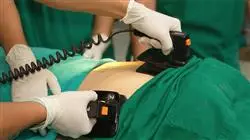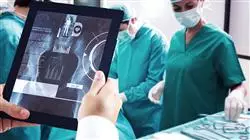University certificate
The world's largest faculty of medicine”
Description
Start today the path to update your knowledge as an emergency physician and grow in a profession that increasingly demands more specialized professionals”

The work performed by emergency specialists is, without a doubt, diverse and hardly monotonous. In a single day, professionals may be faced with critical cases, where patient lives are at stake, as well as cases of highly infectious pathologies that put the health of others at risk. This requires an extremely delicate handling of the available equipment, as well as a detailed and rigorous knowledge of the potential high risk hazards involved.
For this reason, knowing the volatility of the profession, TECH has designed this Postgraduate diploma, which aims to update emergency medicine professionals in two critical aspects within the field: High Consequence Infectious Diseases (HCID) and Advanced Life Support.
Throughout the program, the main challenges when managing an emergency department will be reviewed, especially after the recent pandemic, where clinical safety and quality of care have acquired a predominant role. Specialists will also delve into the ethical and legal aspects and protocols involved in Advanced Life Support in both adult and pediatric patients, as well as the management of High Consequence Infectious Diseases in different situations and contexts.
It should be noted that this is an online Postgraduate diploma, so students do not have to commute or adhere to fixed schedules. On the contrary, the program is totally flexible, so students only need a computer or mobile device with an Internet connection to be able to take this Postgraduate diploma at their own accord, so they can satisfactorily balance it with the rest of their daily obligations.
To follow this high level program, you only need a device with an Internet connection and an infinite desire to learn. The rest is provided by TECH”
This Postgraduate diploma in High Consequence Infectious Diseases (HCID) and Advanced Life Support contains the most complete and up-to-date scientific program on the market. The most important features include:
- Numerous practical cases presented in form of In Focus videos and clinical videos made by experts in Emergency Medicine
- The graphic, schematic, and practical contents with which they are created, provide scientific and practical information on the disciplines that are essential for professional practice
- Practical activity presentations on procedures and techniques
- An algorithm-based interactive learning system for decision-making in the clinical situations presented throughout the course
- Action protocols and clinical practice guidelines which cover the most important latest developments in this specialist area
- All of this will be complemented by theoretical lessons, questions to the expert, debate forums on controversial topics, and individual reflection assignments
- Its special emphasis on evidence-based medicine and research methodologies in dealing with patients requiring Emergency services
- Content that is accessible from any fixed or portable device with an Internet connection
Start today to prepare yourself for pandemics and high risk emergency situations and become a high level professional”
The program’s teaching staff includes medical professionals, who bring their experience to this program, as well as renowned specialists from leading scientific communities and prestigious universities.
The multimedia content, developed with the latest educational technology, will provide the professional with situated and contextual learning, i.e., a simulated environment that will provide immersive specialization programmed to learn in real situations.
This program is designed around Problem-Based Learning, whereby the professional must try to solve the different professional practice situations that arise throughout the program. For that purpose, students will be assisted by an innovative, interactive video system created by renowned and extensively experienced experts in nutritional counseling in the healthy population.
TECH offers you the most complete and up to date syllabus available to help you grow and excel to your highest potential”

This Postgraduate diploma will undoubtedly put the seal of excellence on your resume, not only due to the great education you will receive, but also on account of entities that endorse it"
Syllabus
The structure of the curriculum has been designed by a team of medical professionals that are fully aware of the importance of university studies in hospital and out of hospital emergencies, especially in the area of High Consequence Infectious Diseases (HCID) and Advanced Life Support. This team, aware of the relevance and timeliness of specialization programs, and committed to quality teaching through the use of innovative formats, has created this program specially designed for physicians to learn how to successfully manage cases that require using life support.

A comprehensive syllabus focused on acquiring knowledge and converting it into real skills, created to propel you to excellence"
Module 1. Current Challenges in Modern Emergency Department Management
1.1. Basic Advanced Concepts in Emergency Medicine
1.1.1. Management Challenges in Times of Pandemics
1.1.2. Quality Challenges in the Emergency Department
1.1.3. Quality Care in the Emergency Department Indicators
1.1.4. Patient Safety Challenges in the Emergency Department
1.1.5. Clinical Safety in the Emergency Department Indicators
1.1.6. Biosafety in Urgent Care and Emergency Medicine
1.1.7. Integrating the Emergency Department into the Rest of the Hospital
1.1.8. Urgent Care Services and the Problem of Gender Violence
1.1.9. Clinical Research in the Emergency Department: Is It Possible?
1.1.10. Teaching in the Emergency Department: Beyond Assistance
1.1.11. Humanization of Management in Emergency Departments
Module 2. Advanced Life Support
2.1. Update on Advanced Life Support in Adults
2.1.1. New AHA and ERC Protocols Similarities and Differences
2.1.2. Advanced Life Support in Pandemic Situations
2.1.3. Advanced Adult Life Support in Special Situations
2.1.4. New Challenges in Advanced Life Support
2.1.7. Update on Advanced Pediatric Life Support
2.1.8. Advanced Pediatric Life Support in Special Situations
Module 3. HCID: High Consequence Infectious Diseases
3.1. Introduction
3.1.1. PPE (Personal Protective Equipment)
3.1.2. Emergency Services Diversification. Emergency Circuits
3.1.3. Health Personnel Training
3.1.4. Emergency Department Drills
3.1.5. Patient Transfer and Transport to High Isolation Units
3.1.6. One Health
3.1.7. Respiratory Pathology Action Protocols
3.1.8. Hemorrhagic Fever Action Protocols
3.1.9. Future Threats: How to Prepare

Welcome to TECH, today you will take your career to the next level”
Postgraduate Diploma in High Risk Infectious Diseases (HRI) and Advanced Life Support.
High Risk Infectious Diseases (HRID) are infectious diseases and pathogens that are considered highly dangerous and require special control and additional prevention measures to prevent their spread. Some of these diseases include viruses such as Ebola, Crimean-Congo hemorrhagic fever, West Nile virus, Hantavirus and other serious infectious diseases.
Advanced life support is specialized, advanced medical care provided to critically ill patients who are victims of traumatic situations or suffer from severe or chronic life-threatening illnesses. Healthcare professionals must have additional training in this technique as it requires specialized skills and advanced equipment to maintain the patient's life until more appropriate and specific treatment can be provided.
Update your knowledge of High Risk Infectious Diseases and Advanced Life Support.
When treating patients with HAIE, advanced life support may include critical procedures such as cardiopulmonary resuscitation (CPR) and the use of mechanical ventilation devices, along with the provision of intravenous fluids and medications. In addition, special measures are taken to prevent the spread of infectious disease, such as the use of personal protective equipment, safe disposal of waste and equipment used in treatment, and disinfection of the health care environment.
Specialized care in the treatment of high-risk infectious diseases and the proper use of advanced life support are essential to minimize the risk of disease spread and ensure the survival of patients suffering from infectious diseases. Healthcare professionals working with these patients must be experts in these procedures and techniques to ensure the comprehensive and appropriate care that patients need.
TECH the world's largest digital university has this specialized academic program designed to provide an in-depth understanding of high-risk infectious diseases, as well as skills for the treatment and management of these diseases and advanced life support techniques in medical emergency situations. They will learn to apply this knowledge in practical situations and analyze the social, political and ethical implications of medical care in emergency situations.







